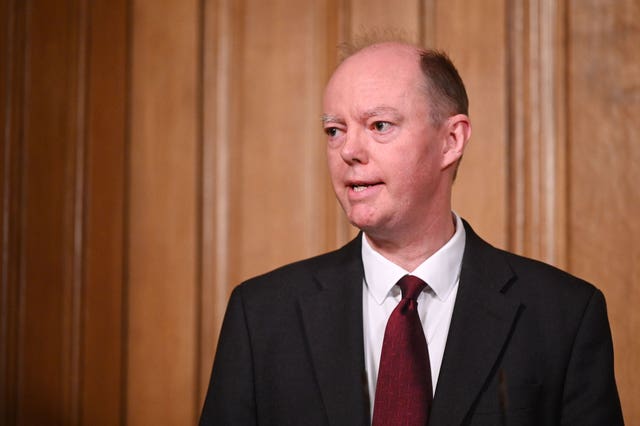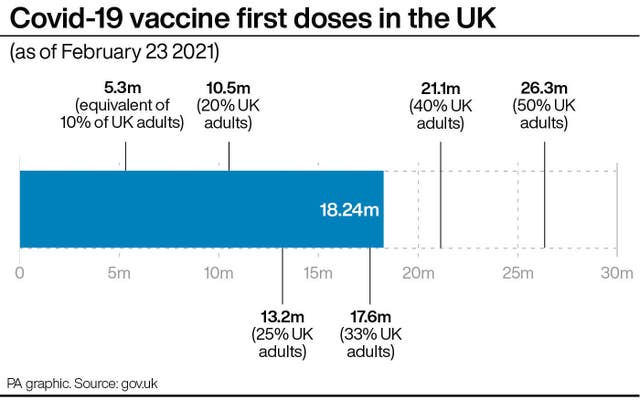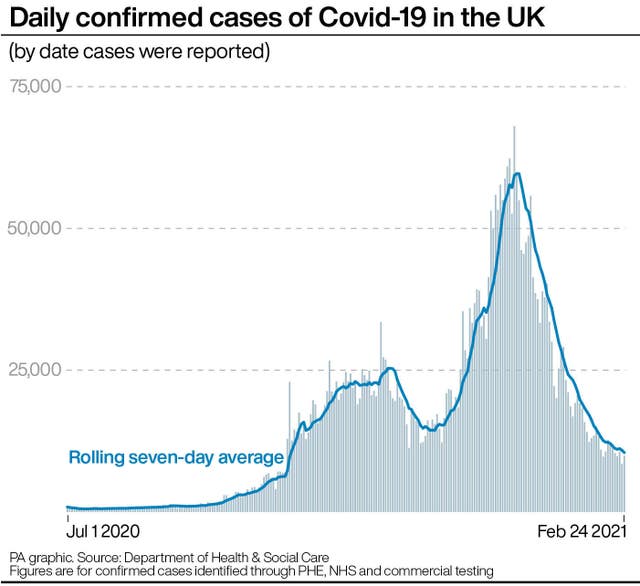Ministers launch new ‘stay at home’ drive as Covid rates continue to fall
Health Secretary Matt Hancock said the success of the vaccination rollout did not mean people could give up on social distancing.

The Government has launched a new “stay at home” drive despite falling coronavirus rates, the success of the vaccine rollout and the announcement of a road map out of lockdown.
Ministers said it was essential that people continued mask-wearing, social distancing and hand washing as restrictions in England began to ease to keep the disease under control.
As a new advertising blitz was launched, England’s chief medical officer Professor Chris Whitty said “we must all continue to play our part” in controlling the spread of the virus.
Earlier, the deputy chief medical officer Professor Jonathan Van-Tam acknowledged that there had been a “slowdown” in the vaccine rollout due to supply fluctuations.

But he insisted he remained confident the targets of giving a first dose to the top nine priority groups by mid-April and to all adults by the end of July will be met.
The latest Government data up to February 23 showed 18,242,873 across the UK had received a first dose of a vaccine – a rise of 326,692 on the previous day.
In other developments:
– The Joint Committee on Vaccination and Immunisation (JCVI) has advised the Government and the NHS to invite more people with learning disabilities to receive Covid-19 vaccines.
– Education Secretary Gavin Williamson set out a £700 million support package to help pupils in England catch up after the disruption to their schooling.
– Ghana became the first country in the world to receive coronavirus vaccines through the United Nations-backed Covax initiative.
The call for people to maintain social distancing came amid continuing pressure from some Conservative MPs for the Government to move faster on lifting restrictions.

Under the plan set out by Boris Johnson on Monday, England’s stay at home order will remain in place until at least March 29 despite the minor easing of restrictions and the return of schools on March 8.
Prof Whitty said that while infection rates were falling, overall numbers remained “very high”, putting pressure on hospitals across the country.
“Vaccines give clear hope for the future, but for now we must all continue to play our part in protecting the NHS and saving lives,” he said.
Health Secretary Matt Hancock said that while the vaccine rollout was going well, it was not the only way to keep rates down.
“I know it’s been a long year but we can’t let up now. Everything we’re doing is bringing us one step closer to beating this virus,” he said.
“So let’s keep going. I encourage everyone to keep playing their part and stay at home – keep washing your hands, wearing a mask and maintaining a social distance which will ensure that, together, we beat this.”
At a No 10 press conference, deputy chief medical officer Dr Jennie Harries acknowledged that the restrictions had had a particular impact on children, but urged them not to start embracing their grandparents again as soon as they received the jab.
“Having got so far down the line with this now … I would encourage children – even if their grandparents have had their vaccinations – not to go hugging them too much until we are absolutely sure what the impact of that vaccine rollout has been,” she said.
“I am sure it is going to be positive but we just need to take a steady course out.”
Prof Van-Tam said he understood people’s frustrations with the pace of the road map, but said it was essential to avoid the need a reimposition of restrictions.

“I completely get it, I am desperate for the football to be back, but actually I would rather do this once and get it right and not have to make any U-turns or backtracking, I would rather just go slowly and steadily and get there in one go,” he said.
He also called on all health and care workers to take up the offer of a vaccine.
NHS England has said around 88% of patient-facing NHS trust healthcare workers in England are likely to have had their first dose of a vaccine, but there are no published figures for people working in social care.
Prof Van-Tam told ITV’s Good Morning Britain that healthcare workers had a “professional responsibility to take steps themselves to prevent them from being in a position where they could harm patients through infectious diseases they might have”.





